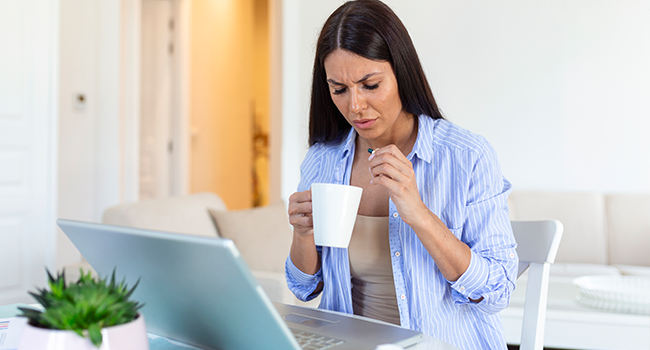Highlights
- Guilt can become excessive and constant when you’re depressed, even when you haven’t done anything wrong.
- Depression affects how your brain processes responsibility, which can make you blame yourself more harshly than the situation calls for.
- Therapy, self-compassion practices, and antidepressants may help reduce guilt by treating the depression underneath it.
Guilt is a natural and human emotion. When you’ve hurt someone, guilt motivates you to apologize and make things right. But if you live with depression, guilt can take on a whole new meaning. You may feel excessively guilty all the time, even for small mistakes. You might even take on the blame for things that aren’t your fault.
A healthcare provider can help you understand what’s driving the guilt and treat underlying depression.
Guilt and Depression at a Glance
Guilt is an emotion that we’ve all experienced at some point. It’s when we feel like we’ve harmed or wronged another person (or a group of people) and feel bad about it. It can be a healthy emotion: if you’re not depressed, guilt can energize you to take responsibility and repair the situation.
In depression, guilt isn’t healthy. A chronic sense of guilt is a core symptom of depression, according to the
For example, a person without depression might feel guilty because they accidentally stepped on someone’s toe. They apologize for the hurt they caused and move on. They might be more careful about where they step moving forward.
Someone with depression might feel guilty for a much more minor offense, or even for something that wasn’t their fault at all. You might not be able to move on, even after the person you believe you’ve harmed has forgiven you.

How Guilt and Depression Interact
Guilt and depression have a deep relationship. Not only can depression cause excessive guilt, but feeling guilty all the time can also make depression worse.
Part of the relationship between depression and guilt lies in how depression affects the brain.
- One is the anterior temporal lobe, which stores your knowledge of social rules and what’s considered appropriate behavior.
- The other is the subgenual region of the brain, which plays a major role in processing guilt, self-blame, and emotional pain.
In
Many people with depression also feel guilty about depression itself, which can create a vicious cycle. You may blame yourself for not getting better fast enough or think you should be able to “push through it.” You may compare yourself to others and tell yourself you shouldn’t feel depressed at all. If depression affects your energy or motivation, you may then feel guilty for not keeping up with responsibilities or relationships. This cycle can make the guilt feel even heavier.

Coping When You’re Depressed and Feeling Guilty
Guilt in depression can be persistent and painful. But there are ways to break the cycle and respond to guilt more gently.
Self-Kindness Scripts
Self-kindness is one of the key components of self-compassion. It means being understanding and gentle, rather than harsh and critical, toward yourself when you’re feeling guilty or inadequate. Practice speaking to yourself with kindness when you feel guilty, just like you would speak to a beloved friend.
For example, you can try repeating these lines to yourself:
- I made a mistake. That doesn’t make me worthless.
- I’m allowed to learn from this without tearing myself down.
- I’m doing the best I can with what I have today.
Grounding & Pause Techniques
Mindfulness is another component of self-compassion. Taking a mindful approach to guilt means not pushing it away or judging yourself for it, but also not taking it on as a part of you. Don’t fight the guilt, but also don’t over-identify with it. Recognize it for what it is: just an emotion.
Simple mindfulness techniques can help you bring this practice into your everyday life. Try:
- Breathing in and breathing out slowly, paying attention to how the air feels moving in and out of your nose.
- Taking a brief pause when you first notice guilt coming up, and allowing yourself a moment to understand what triggered it before reacting.
Gentle Movement
Exercise can help in several different ways. Research shows that aerobic activity can
Don’t push yourself too hard. Remember that exercise is a form of self-love, not a form of self-punishment.
Journaling Prompts to Reframe Self-Blame
It can also help to write about your experiences. But be careful not to simply ruminate on whatever is making you feel guilty. Journaling can help you overcome excessive guilt through your intentional self-reflection.
Here are some prompts to use:
- What part of this situation is actually my responsibility, and what part isn’t?
- What would I say to a friend who was blaming themselves for this?
- What do I need right now to move forward with more compassion for myself?
Healthy Support
Connecting with supportive people in your life can help you build a healthier self-image and understand when your guilt is inappropriate. This doesn’t necessarily need to be formal support like therapy (although some form of mental health treatment is needed to overcome depression). Just talking to your loved ones about your guilt may help you feel more at ease.
You might also consider joining support groups with other people who live with depression. This can be especially helpful if you experience guilt about depression itself. When you see that other people you admire also experience the same things you do, you might be able to treat yourself more kindly.
Evidence-Based Treatments That Reduce Guilt and Improve Depression
Excessive guilt is one of the core symptoms of depression — and depression can be treated. Many people recover from it every day with professional mental health treatment. You can learn how to manage your symptoms, including guilt, and get back to feeling like yourself again.
Cognitive-Behavioral Therapy (CBT)
CBT is
A CBT therapist can help you identify these thinking “traps” that you fall into. You might replace this thought with something more accurate and helpful, like: “I made a mistake. All I can do now is fix it and move on. One mistake doesn’t define my worth.” This is especially helpful when excessive guilt stems from childhood experiences. Some people saw these patterns in other family members, others faced disproportionate punishment or criticism — all these can contribute to increased self-blame and require new approaches to thinking about yourself.
Acceptance and Commitment Therapy (ACT)
ACT falls under the umbrella of CBT, but also uses concepts from mindfulness to help people with depression. It helps you learn how to stop fighting against your emotions and accept yourself, your feelings, and the world as they are. This can help you break the cycle of depression and guilt.
Compassion-Focused Therapy
Compassion-focused therapy is another method derived from CBT. It helps you learn how to respond to yourself with warmth rather than criticism.
Antidepressant Medications
Some people may be recommended to take psychiatric medication alongside therapy. This combination has been found to be the most effective for treating depression. Taking medication is a personal decision, but also the one you make with a doctor’s guidance. If you have any questions or concerns about starting antidepressants, connect with an experienced provider at MEDvidi. You’ll have your symptoms assessed, get answers to your questions, and receive personalized treatment for depression online, including medication prescription, if deemed necessary.
When to Seek Help
Guilt itself isn’t an unhealthy emotion — it’s a human one. We feel guilt for different reasons, many of which are completely appropriate. But if you feel excessive guilt all the time, tend to blame yourself even for things that aren’t your fault, and experience other symptoms like low mood and hopelessness, then it could be a sign of depression.
You don’t need to wait until your symptoms turn into a mental health crisis to seek support. If you experience persistent sadness for over two weeks, worthlessness, and fatigue, reach out to a mental health provider right away. If you’re thinking about ending your life or are worried you might harm yourself, call or text 988 Suicide & Crisis Lifeline (toll-free), or Samaritans (116-123 or via chat) for immediate support.
How Loved Ones Can Help
It’s painful watching your loved one go through depression and feel guilty for even the smallest mistakes. Your support can make a huge difference, even if it can’t replace professional treatment. Here are some things you can say and do:
- Validate their feelings. Even if it doesn’t make sense to you that your loved one feels guilty about something, that doesn’t make it any less real to them. Validate their emotion of guilt, not the cause of it. For example, don’t say: “I can see why that would make you feel guilty.” Instead, try: “I’m not angry with you, but your feelings of guilt are valid.”
Provide reassurance — to an extent. You can reassure your loved one that they haven’t done anything to feel guilty about. But reassuring over and over again can sometimes be unhelpful. Your loved one’s guilt isn’t based entirely on logic, so it might be hard for them to believe your words.
Highlight their strengths. Remind them of the qualities you appreciate in them — their honesty, their effort, their kindness, or their willingness to work on things. This can help them build a more balanced view of themselves.
Help them seek support. At the end of the day, your loved one will need professional treatment to overcome depression. But when you’re depressed, it can be hard to have the energy and motivation to connect to treatment yourself. You might offer practical support, like helping them look through their insurance panel or arranging first appointments.
Get Support for Depression
Depression can turn everyday guilt into something heavier and more painful. The good news is that depression is treatable. With support, you can learn to understand these feelings of guilt and respond to them with more self-compassion. Book an appointment today to have a comprehensive mental health assessment and receive a personalized plan for depression treatment online.













